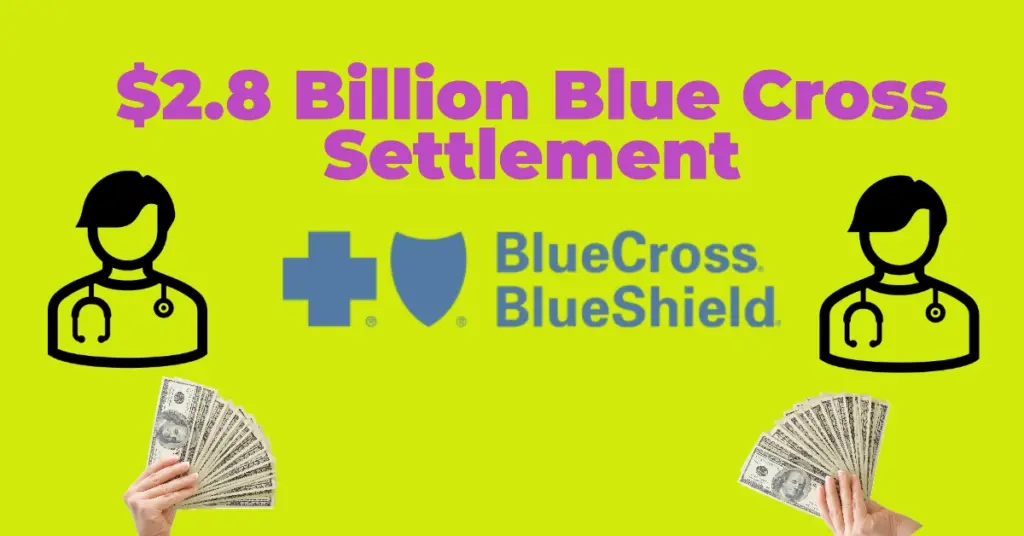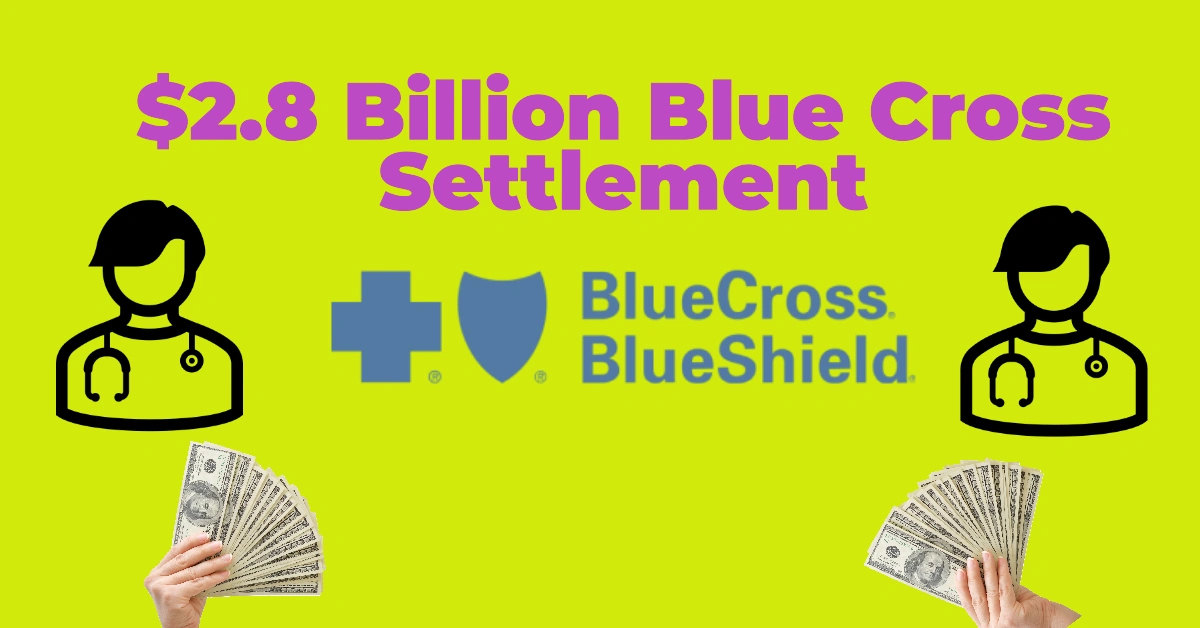
Understanding the Blue Cross Blue Shield Settlement: A Comprehensive Guide
The Blue Cross Blue Shield (BCBS) settlement represents a significant legal event impacting millions of Americans who receive health insurance through these providers. This extensive class-action lawsuit alleged that BCBS companies conspired to limit competition, ultimately raising prices and reducing choices for consumers. Understanding the settlement, its implications, and its timeline is crucial for anyone affected. This article delves into the details of the settlement, providing clarity on when it will be over, who is affected, and what actions individuals and businesses can take.
Background of the Blue Cross Blue Shield Lawsuit
The lawsuit, initially filed in 2012, accused Blue Cross Blue Shield Association and its member companies of violating antitrust laws. The core allegation was that these entities agreed to divide markets geographically and refrain from competing with each other. This arrangement, plaintiffs argued, led to inflated premiums and restricted access to affordable healthcare options. The legal battle spanned several years, involving complex economic analysis and extensive documentation.
The plaintiffs included individual subscribers and employer groups who purchased BCBS insurance. They claimed that the anti-competitive practices resulted in overcharges for health insurance coverage. The case gained considerable attention due to its potential impact on a vast number of people and the healthcare market as a whole.
Key Allegations and Legal Arguments
The central argument revolved around Section 1 of the Sherman Antitrust Act, which prohibits agreements that unreasonably restrain trade. The plaintiffs contended that the BCBS Association and its members entered into an illegal agreement to allocate territories, preventing competition across state lines. This territorial agreement allegedly allowed each BCBS company to operate as a virtual monopoly in its designated area.
Another key allegation was that BCBS companies limited the number of independent Blue providers, further reducing competition. By controlling the supply of healthcare services, these companies were able to maintain higher prices and less favorable terms for consumers and employers. The plaintiffs sought monetary damages and injunctive relief to prevent future anti-competitive behavior.
The Settlement Agreement: An Overview
In October 2020, a settlement agreement was reached, marking a major turning point in the case. The settlement involved a substantial monetary fund and significant changes to the business practices of Blue Cross Blue Shield companies. The agreement aimed to address the concerns raised by the plaintiffs and promote greater competition in the health insurance market.
The settlement includes a $2.67 billion fund to compensate individuals and businesses who purchased BCBS insurance between 2008 and 2020. Additionally, the agreement requires BCBS companies to make changes to their licensing agreements and business practices to foster more competition. These changes include allowing BCBS companies to offer coverage outside their designated territories and removing restrictions on the number of Blue providers.
Who is Eligible for Compensation?
Eligibility for compensation under the settlement is determined by specific criteria. Generally, individuals and businesses who purchased or were covered by a Blue Cross Blue Shield health insurance plan between February 2008 and October 2020 are eligible to file a claim. However, certain exceptions apply, such as those covered by Medicare or Medicaid.
The amount of compensation each claimant receives will depend on several factors, including the type of BCBS plan, the duration of coverage, and the amount of overcharges incurred. The settlement administrator is responsible for determining the eligibility and compensation amounts for each claim.
Timeline of the Settlement Process
Understanding the timeline of the settlement process is essential for anyone seeking to file a claim or stay informed about the developments. The settlement process involves several key stages, each with its own deadlines and requirements.
Initial Notice and Claim Filing Period
The initial phase of the settlement process involves notifying potential class members about the settlement and their rights. This is typically done through direct mail, email, and public announcements. The notice provides information about the settlement, eligibility criteria, and how to file a claim. The claim filing period is a specific timeframe during which eligible individuals and businesses can submit their claims for compensation. This period usually lasts several months.
Claim Review and Determination
After the claim filing period ends, the settlement administrator reviews each claim to determine its validity and the appropriate compensation amount. This process may involve requesting additional documentation or information from claimants to verify their eligibility. The settlement administrator uses a standardized methodology to calculate the compensation amounts based on the terms of the settlement agreement.
Distribution of Settlement Funds
Once all claims have been reviewed and approved, the settlement funds are distributed to eligible claimants. The distribution process may involve sending checks or electronic payments to claimants. The timing of the distribution depends on various factors, including the number of claims, the complexity of the review process, and any legal challenges to the settlement.
When Will the Settlement Be Over?
Determining when the BCBS settlement will be completely over involves considering several factors. The settlement process is multifaceted, and the timeline can be influenced by legal proceedings, administrative tasks, and the responsiveness of claimants. Here’s a breakdown of the key elements affecting the settlement’s duration:
The Claims Process
The claims process itself is a significant factor. The claim filing deadline was November 15, 2021. After this date, the settlement administrator began the process of reviewing and validating the claims. This process involves verifying the eligibility of each claimant, assessing the amount of damages, and preparing for the distribution of funds. Given the large number of potential claimants, this process can take a considerable amount of time.
Appeals and Legal Challenges
Legal challenges and appeals can also prolong the settlement timeline. Although the settlement has been approved, there may be objections or appeals from class members or other interested parties. These legal challenges can delay the distribution of funds and the final resolution of the settlement. It’s essential to monitor any updates from the settlement administrator or legal counsel regarding potential appeals.
Distribution of Funds
The distribution of funds is another critical step in the settlement process. Once the claims have been validated and any legal challenges have been resolved, the settlement administrator will begin distributing the settlement funds to eligible claimants. The distribution process can take several months to complete, depending on the number of claimants and the method of distribution (e.g., checks, electronic transfers). Claimants should ensure they have provided accurate contact information to receive their payments promptly.
Final Resolution
The settlement is considered over when all claims have been processed, all funds have been distributed, and any remaining administrative tasks have been completed. This includes addressing any outstanding issues or disputes that may arise during the settlement process. The exact date when the settlement will be completely over is difficult to predict with certainty, but it is expected to take several years from the initial settlement agreement.
Ongoing Obligations and Future Implications
Even after the initial claims process and distribution of funds are complete, the BCBS settlement has ongoing obligations and future implications for the healthcare market. These include:
Changes to Business Practices
The settlement requires BCBS companies to make significant changes to their business practices to promote greater competition. These changes include allowing BCBS companies to offer coverage outside their designated territories and removing restrictions on the number of Blue providers. These changes are intended to foster a more competitive market and provide consumers with more affordable and diverse healthcare options.
Monitoring and Compliance
The settlement includes provisions for monitoring and compliance to ensure that BCBS companies adhere to the terms of the agreement. An independent monitor is typically appointed to oversee the implementation of the settlement and to report on BCBS companies’ compliance with the required changes. This monitoring process helps to ensure that the settlement achieves its intended goals and that BCBS companies do not engage in anti-competitive behavior in the future.
Long-Term Impact on Healthcare Market
The BCBS settlement is expected to have a long-term impact on the healthcare market. By promoting greater competition and transparency, the settlement may lead to lower premiums, more choices for consumers, and improved access to healthcare services. The settlement also serves as a reminder to other healthcare providers and insurers that anti-competitive behavior will not be tolerated and that they must comply with antitrust laws.
Steps to Take if You Are Affected
If you believe you are eligible for compensation under the BCBS settlement or if you are concerned about the impact of the settlement on your healthcare coverage, there are several steps you can take:
Review Settlement Information
Start by reviewing the official settlement website or contacting the settlement administrator to obtain detailed information about the settlement, eligibility criteria, and the claims process. This will help you determine whether you are eligible for compensation and what steps you need to take to file a claim.
Gather Documentation
Gather any documentation that supports your claim, such as insurance policies, premium statements, and proof of coverage. This documentation will help the settlement administrator verify your eligibility and calculate your compensation amount.
File a Claim
If you are eligible, file a claim before the deadline. Follow the instructions provided by the settlement administrator and provide all required information and documentation. Be sure to keep a copy of your claim for your records.
Stay Informed
Stay informed about the progress of the settlement by monitoring the settlement website or contacting the settlement administrator for updates. This will help you stay aware of any important deadlines or developments that may affect your claim.
Expert Opinions and Legal Commentary
Legal experts and industry analysts have offered various perspectives on the BCBS settlement and its potential impact. Some experts believe that the settlement represents a significant victory for consumers and will lead to greater competition in the healthcare market. Others are more cautious, noting that the settlement may not fully address the underlying issues and that further reforms are needed to ensure affordable and accessible healthcare for all Americans.
Legal commentary has focused on the implications of the settlement for antitrust law and the role of class-action lawsuits in holding corporations accountable for anti-competitive behavior. Some commentators have praised the settlement as a model for future antitrust cases, while others have raised concerns about the effectiveness of monetary settlements in deterring future misconduct.
Resources for Further Information
For those seeking more information about the BCBS settlement, several resources are available:
- Official Settlement Website: The official settlement website provides detailed information about the settlement, eligibility criteria, the claims process, and important deadlines.
- Settlement Administrator: Contacting the settlement administrator directly can provide answers to specific questions and assistance with the claims process.
- Legal Counsel: Consulting with an attorney can provide legal advice and representation if you have concerns about the settlement or your rights as a class member.
- Consumer Protection Agencies: Consumer protection agencies can provide information and resources to help you understand your rights and protect yourself from unfair business practices.
Conclusion
The Blue Cross Blue Shield settlement represents a significant legal event with far-reaching implications for the healthcare market. While determining the exact end date of the settlement process is challenging, understanding the key stages, potential delays, and ongoing obligations can help individuals and businesses navigate the process effectively. By staying informed, gathering necessary documentation, and following the instructions of the settlement administrator, those affected can seek compensation and contribute to a more competitive and transparent healthcare system. The settlement is a step towards ensuring that healthcare providers and insurers are held accountable for their actions and that consumers have access to affordable and quality healthcare services. As the settlement progresses, it is crucial to remain vigilant and advocate for policies that promote competition and protect the rights of consumers in the healthcare market.

